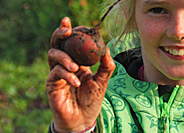Old cabbage and beetroot varieties get a new lease of life
The research project MOVE will be studying how the seeds of old vegetable varieties with interesting properties can be made available to hobby growers and organic farmers.

In the good old days cabbage tasted differently and beetroot was available in several different sizes. The old vegetable varieties, which are no longer on the market, may have different characteristics from the modern ones, and in some cases these properties are of particularly interest to organic growers.
Therefore, the scientists behind MOVE - a new two-year project at Aarhus University - will be collecting seeds from the Nordic Gene Bank and testing old varieties of cabbage, beetroot and possibly carrots in cooperation with the seed company Vikima Seed. The project will also be producing seeds from the old varieties, and the seed production will be taking place at experienced seed growers in Vikima Seed’s network.
"Many of the varieties that are no longer in use are adapted to a less intensive cultivation system with lower inputs of fertilizer. They can therefore have a lower nutrient requirement and can be more robust and resistant to disease. These are characteristics that are of particular interest to organic farming," says project manager Lise Deleuran from the Department of Agroecology at Aarhus University.
Growing interest for old varieties
In recent years there has been a growing interest among both organic farmers and hobby farmers in Denmark for preserving and using old or obsolete plant varieties. Research is being done into the robustness, health and history of the varieties and this has helped to raise awareness. However, the seeds for some of these varieties are no longer available on the market.
The reason is the current very high demand for uniformity, and the properties that provide a highly standardised product have become dominant. At the same time, many of the small seed companies have been bought up by large international players. The result is that very few varieties are now available to consumers, explains Lise Deleuran.
"Health-promoting substances have, for example, been found in some of the varieties that are no longer on the market. We would like to make these available – for small businesses as well as private gardeners," she says.
EU Seed Law on stand-by
Currently, work on the new EU Seed Law is on hold, but in Denmark it is now legal to swap seeds for private use. Only seeds for commercial marketing and use are covered by the EU legislation on seeds and the MOVE project is thus targeting the smaller commercial producers. There are three target groups for MOVE: the private non-commercial growers, the small (organic) growers, and the large commercial vegetable growers
Lise Deleuran hopes that MOVE will be able to find varieties that are not currently available and follow them all the way through the chain.
"The aim is certainly to make some of the varieties available so they can also be grown by organic farmers as commercial crops," she says.
The project MOVE (Marketing of Organic VintagE plant material) is part of the Organic RDD 2.2 programme, coordinated by ICROFS (International Centre for Research in Organic Food Systems). The project is funded via the Green Development and Demonstration Programme (GUDP) under the Ministry of Environment and Food.
Further information:
Lise Christina Deleuran, Department of Agroecology, Aarhus University.